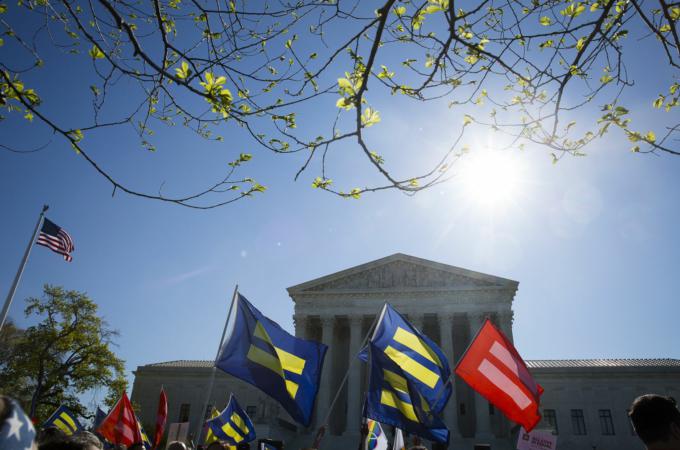Questionable use of scare quotes
Southern states have been busy this spring passing laws that follow naturally on the Supreme Court's decision affirming same-sex marriage.
The court concluded its opinion last June by saying that the First Amendment protected religious people who hold traditional views on sex. Since then, a number of state legislatures have passed laws designed to implement that protection. Debates often focus on people in the matrimonial business, like bakers, who might decline to play a role in gay weddings.
The politics of sex roles has moved pretty fast since 2015. Transgender issues are now routinely bundled with claims for gay and lesbian equality. So another bone of contention has been what bathrooms such people can use.
The cultural censors have been on this movement like a chicken on a June bug. When the governor of North Carolina signed one of these laws, Apple, Google, the Bank of America and the National Basketball Association made threatening noises about pulling out their business. PayPal canceled plans to build an operations center in Charlotte. Half a dozen cities (New York, San Francisco, Seattle -- you get the idea) prohibited travel to North Carolina by municipal employees.
Mississippi and Georgia felt the same kind of heat. Disney told Georgia it would not film shows there. Coke and Home Depot, both headquartered there, complained. The NFL said it might not hold the Super Bowl in Atlanta. In the face of this pressure, Georgia Gov. Nathan Deal vetoed that state's bill.
In their accounts of these disputes, the print and electronic media show an increasing tendency to refer to "religious freedom" in scare quotes. Like Chris Farley playing Bennett Brauer on Saturday Night Live or Mike Myers as Dr. Evil in the Austin Powers films.
Quotation marks usually signify that the writer is repeating someone else's words exactly. (Richard Nixon proclaimed, "I'm innocent.") Sometimes we use them to indicate that we are coining a phrase, or stipulating to a particular usage. (He called his flying platform a "hoverboard.")
But scare quotes, or sneer quotes as we sometimes call them, signify that a word or phrase is being used in an ironic sense -- a shorthand way of saying "so-called." When the Los Angeles Times reports that "Georgia Gov. Nathan Deal on Monday vetoed a 'religious liberty' bill," it is telling us that religious liberty is not, properly speaking, concerned with how people live their sex lives.
This notion should strike Catholics as odd. Sex is baked into our sacraments. In Christian marriage, sex is, Pope Francis recently said, "a path of growth in the life of grace." In other circumstances, it is unholy.
Catholics are not alone in attaching religious significance to sexual practice. Jewish law sees sex between husband and wife as a mitzvah. But it frowns on sexual relations between men, as does the Quran. Buddhist monks practice celibacy as a form of purification conducive to spiritual enlightenment.
Perhaps the scare quotes are meant to qualify the meaning of the word "liberty" rather than "religion." This is a more disturbing possibility. One who misunderstands what religious people believe will probably be willing to accept correction from them, since they presumably know better. But one who would deny religious people the freedom to act according to their faith disagrees on a matter of principle, not of fact.
I hope I'm not reading too much significance into a couple of punctuation marks. But I fear that we are becoming a society where sexual license is more important than religious freedom. The next step, which the Supreme Court foresaw last year, will be to insist that everyone confess adherence to the new faith or suffer the consequences.
- Garvey is president of The Catholic University of America in Washington, D.C.



















